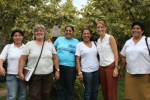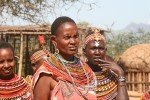Built on my initial phase of research in Nicaragua, this collaborative project, brings together social science and grass roots community advocacy with a focus on documenting how the women’s movement in Nicaragua profoundly challenges systemized gender inequities. Although the women’s movement in Nicaragua is often linked to the political struggle of the Sandinista Revolution, by… Continue Reading Nicaragua Women’s Social Movement
Research Projects
Land Ownership, Civic Participation & Violence among Women in Tanzania
Throughout East Africa, and in Tanzania in particular, domestic violence is widespread. Rates are especially alarming in rural areas, where culturally sanctioned violence, combined with low levels of formal education, leave women in subordinate positions with little knowledge of their rights. In a similar project to that described in Nicaragua, I aimed to replicate and… Continue Reading Land Ownership, Civic Participation & Violence among Women in Tanzania
Land Ownership, Women’s Empowerment, & Gender-based Violence in Nicaragua








Violence against women is the most pervasive human rights violation in the world. Rapidly changing conditions in the restructuring of resources in “developing” countries provide a perfect context for an analysis of social structures that reflect dominant roles and elevated status that may, in turn, severely limit the amount of control women can exercise over their own bodies. Gender inequity is especially visible within the area of property rights, with pervasive inequities in land ownership being recognized as a violation of women’s rights. My initial research efforts in the area of transnational feminism were directed at investigating how land ownership contributes to a system in which female subordination is sustained and reproduced, thereby increasing women’s risk of violence. Until recently, these two major violations of women’s rights – gender-based violence and property rights – had been addressed independently of each other. In partnership with the Centro de Mujeres Xochilt Acalt, we examined how structural inequities lead to power imbalances and gender-based norms that perpetuate threats to women’s health and safety through an examination of land ownership. Our research was supported by a National Science Foundation Office of International Science and Engineering (grant 0714697).
- Grabe, S., & Grose, R., & Dutt, A. (2015). Women’s land ownership and relationship power: A mixed methods approach to understanding structural inequities and violence against women. Psychology of Women Quarterly, 39, 7-19.
- Grose, R. & Grabe, S. (2014). The explanatory role of relationship power and control in domestic violence against women in Nicaragua: A feminist psychology analysis. Violence Against Women, 20, 972-993.
- Grabe, S., Dutt, A., & Dworkin, S. (2014). Women’s community mobilization and well-being: Local resistance gendered social inequities in Nicaragua and Tanzania. Journal of Community Psychology, 42, 379-397.
- Grabe, S. (2012). An empirical examination of women’s empowerment and transformative change in the context of international development. American Journal of Community Psychology, 49, 233-245.
- Grabe, S. (2010). Promoting gender equality: The role of ideology, power, and control in the link between land ownership and violence in Nicaragua. Analyses of Social Issues and Public Policy, 10,146-170.
- Grabe, S. (2010). Invited chapter: Women’s human rights and empowerment in a transnational, globalized context: What’s Psychology got to do with it? In M. A. Paludi (Ed.), Feminism and Women’s Rights Worldwide. (pp. 17-46). Westport, CT. Praeger Publishers/Greenwood Publishing Group.

